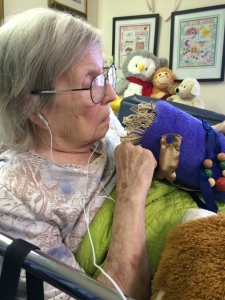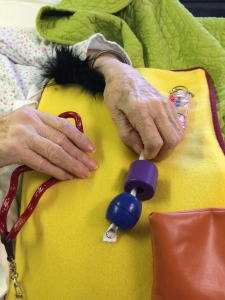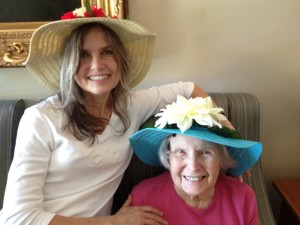 The caregiving years have been divided into six stages by Denise Brown and posted on her website, caregiving.com. If you are just entering the caregiving arena, the expectant caregiver stage may be a big help.
The caregiving years have been divided into six stages by Denise Brown and posted on her website, caregiving.com. If you are just entering the caregiving arena, the expectant caregiver stage may be a big help.
Stage 1: The Expectant Caregiver
In the near future, I may help a family member or friend.
Who are you?
You have a growing concern that, within the near future, your family member or friend will need more and more of your assistance and time. You’re concerned because of your relative’s age, past and present medical condition, and current living condition.
Your keyword: Ask
–Ask questions of your caree.
–Ask questions of health care professionals.
–Ask questions of lawyers and financial planners.
–Ask questions of your family members who may be involved in the caregiving role.
Your Challenge
To learn and understand your caree’s needs: health, financial and emotional.
Your Purpose
You expect to become a family caregiver; this is your time to prepare. You should research options, gather information, and provide the opportunity for your caree to share his or her feelings and values. This is also your time to concentrate on taking care of yourself–keeping up with family and friends, enjoying your hobbies and interests, pursuing your career goals.
As an “expectant caregiver,” what can you do?
1. Consult with a good lawyer familiar with eldercare issues.
Find out about durable powers of attorney for finances and health care as well as living wills; start the process to ensure your caree has the necessary legal papers in order. Ask the attorney: What do we need to know to be prepared for the future? What additional documents will we need? What should we keep in mind? (A durable power of attorney for finances and health care appoints an agent to make decisions on behalf of your caree when he or she is unable to. If you live in one state and your caree in another, consider having documents created for both states.)
2. Determine financial situations.
Knowing the financial status of your caree can help determine future health care choices. Determine monthly income from pensions and social security; learn about annuities, stock investments and bank accounts. Meet with financial planners to understand how to ensure investments last as long as possible.
3. Investigate community health care options.
Which home health care agencies offer quality, affordable home care? Which housing options are available–retirement communities, assisted living centers? Contact community organizations to request brochures and pamphlets.
In addition, consider your family member’s current living condition. Will your aging relative be able to reside safely in her home if she uses a wheelchair, becomes bed-bound? What changes can you make today that will prevent future barriers to providing care in her home? Or, are the necessary changes almost an impossibility? If so, what other options do you have: your home, an assisted living facility, a retirement community?
4. Determine the current health care providers.
Be familiar with physicians and learn as much as you can about medications.
5. Concentrate on the reality of the situations.
Keep a realistic view of your situation: What’s the worst that could happen? What’s the best possible outcome? Then, determine what options are available for each of these outcomes.
6. Start a journal; chronicle your feelings, your concerns and your actions.
You may be surprised at feelings of loss. Your preparation of the future allows you to see what your caree–and you–might lose. You both will experience changes in your relationship, your schedules, your amount of freedom. Write down your thoughts about the potential losses–and how you might be able to hang on to them, through minor adjustments and changes, for a little longer.
7. Take time to sort out your own issues.
It’s easy to overlook these issues when life seems easy. Caregiving, especially as it intensifies, will make life hard. And, it’s harder if you have unresolved emotional work as it relates to your caree or other family members.
If you have difficulty standing up for yourself or finding your voice, this is a good time to work with a therapist or life coach to gain confidence in your decisions and your voice.
Do you struggle with the idea of asking for help? Now is a good time to figure out why and start practicing. Knowing how and when to ask for help is a great skill, which will become a huge asset for you.
The Four Agreements, A Practical Guide to Personal Freedom, a book by Don Miguel Ruiz, offers insights about our personal codes of conduct. As your caregiving journey continues, you’ll interact with family, friends and health care professionals who will drive you nuts. This book will give you the tools so you can stay sane.
8. Find your best shape–physically and financially.
Find a work-out routine you like. Maximize the amount of healthy foods you eat. Pay off your debts. Save as much as you can. Uncomfortable managing money? Read books and take classes (online and in your community) to become comfortable. You’ll need to be at your best—physically, emotionally and financially.
9. Learn your caree’s life story.
Document the story in a journal, video or audio recording. Collect recipes, photos, letters, poems and records that reflect your caree’s life and achievements. Ask questions about your caree’s childhood, parents, siblings and first loves. Involve other family members, including children, in the discussions.
10. Begin each day with the knowledge that you have love.
Perhaps the toughest battles in caregiving begin within. Most battles really are about whether or not you are loved—by your caree, by other family members, by friends, by your significant other. End the battle now: Know you have the love. Know it now so you can remind yourself later.
11. An apple a day…
What can you do on a regular basis to keep yourself healthy? Be good to yourself—you are too important today (and tomorrow and every day after that) to let your own health slip. In other words, what’s your apple?








Recent Comments